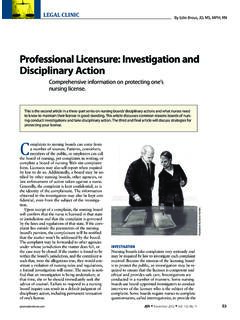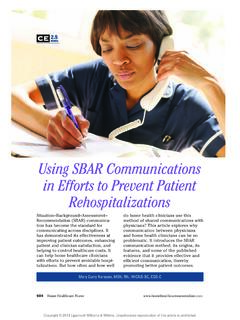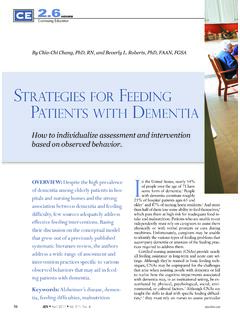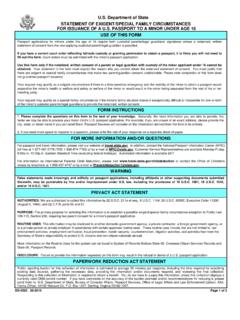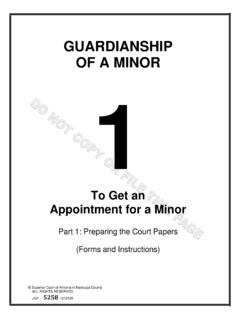Transcription of Minors’ Rights in Medical Decision Making
1 Copyright @ Lippincott Williams & Wilkins. Unauthorized reproduction of this article is the past, minors were not considered legally capable of Making Medical decisions and wereviewed as incompetent because of their age. The authority to consent or refuse treatment for aminor remained with a parent or guardian . This parental authority was derived from theconstitutional right to privacy regarding family matters, common law rule, and a generalpresumption that parents or guardians will act in the best interest of their incompetent , over the years, the courts have gradually recognized that children younger than18 years who show maturity and competence deserve a voice in determining their course ofmedical treatment.
2 This article will explore the Rights and interests of minors, parents, andthe state in Medical Decision Making and will address implications for nursingadministrators and and how doesa minor show ma-turity and the abil-ity to make a meaningful, well-informeddecisionregardingtreatment? At what age doesa child or adolescent have thecognitive ability and the emo-tional maturity to fully un-derstand the consequences ofchoosing or refusing medicaltreatment? And when does thestate s interest in protecting lifesupersede either a minor s ortheir parents wishes? These arequestions that have created nu-merous ethical dilemmas andlegal conundrums.
3 Nursing ad-ministrators who may be in themidst of the conflict must bewell aware of the Rights andinterests of all parties controversy has been thesubject of much debate overthe years by state lawmakersand Medical professionals. Issuesthat have been disputed areparental Rights and responsi-bility, minors Rights , and thevulnerability and competence ofthe dispute has led100 JONA S Healthcare Law, Ethics, and Regulation / Volume 9, Number 3 / July September 2007 JONA S Healthcare Law, Ethics, and Regulation / Volume 9, Number 3 / CopyrightB2007 Wolters Kluwer Health | Lippincott Williams & WilkinsAuthor Affiliations: Shriners Hospitals forChildren-Chicago, Chicago, author.
4 Kathryn Hickey, BA,RN, Shriners Hospitals for Children-Chicago,2211 N Oak Park Ave, Chicago, IL Rights in MedicalDecision MakingKathryn Hickey, BA, RNCopyright @ Lippincott Williams & Wilkins. Unauthorized reproduction of this article is vast differences in the ways that states addressthese determine the competence of a minor , courts lookat age, experience, degree of maturity, judgment skills,the demeanor of the minor , evidence of separatenessfrom parents, and the particular facts in the , the competent minor s wishes regarding medicaltreatment incidentally coincide with that of the parentand protect the state interests.
5 Matters become muchmore complicated when they , who may be called upon to intervene,may need to seek legal counsel to sort out the variety ofinterests involved in these of MinorsAs children grow from infancy to young adulthood,parents and guardians gradually relinquish responsi-bility and Decision Making to them, while remaining asa safety net for them. This is true for Medical decisionmaking as well. It is clear that young children lack theexperience, judgment, and cognitive ability to be self-governing in all matters. States and courts have, withsome exceptions, never allowed children younger than12 years to make Medical decisions for themselves andexercise infants and youngchildren, decisions regarding Medical treatment havebeen in the hands of the parent or guardian .
6 Adoles-cents are caught in a limbo-like state between thedependency of childhood and the autonomy of adult-hood. Their cognitive ability and capacity to reasonare similar to those of an , adolescentsmay lack the moral responsibility, judgment, and ex-perience to understand the outcome of their actionsand decisions. They may have more volatile emotionsand may look only at short-term consequences. Thus,they remain in an ambiguous state regarding self-determination. The legal determination of majority has been defined by chronological age (18 years inall but 4 states), marital or parental status, and self-sufficiency, whereas the ethical determination of minors Decision - Making capabilities has been much of a minor s competence formedical Decision Making should include evidencethat the minor has the ability to understand the pur-pose of treatments, risks, both long- and short-termconsequences, benefits, and alternatives to treat-ments.
7 In addition, evidence must be present to ensurethat the minor is able to make an informed decisionwithout Consent to Treatmentand Participation in ResearchAt the core of these issues is informed consent, whichhas been viewed by the courts as a basic consent and the right to refuse treatmentare protected by the constitutional right to privacy. Insome jurisdictions, the right to informed consent arisesfrom the law of battery in that the patient has a right tobe free from unconsented touching of their consent presumes respect for patient auton-omy and the provision of full and accurate information toa patient to enhance Decision Making .
8 These mandatesapply to both the acceptance and the refusal of treat-ment. Informed consent must include the following:1. an understandable explanation of the condition,the recommended treatment, the risks and benefits ofthe proposed treatment, and any alternatives;2. an assessment of the person s understanding ofthe information provided;3. an assessment of the competence of the minoror surrogate to make Medical decisions; and4. assurance that the patient or surrogate has the ability tochoose freely between alternatives without can and should participate in Medical decisionmaking commensurate with their developmental leveland ability.
9 However, the concept of informed consenthas only limited application in pediatric care. Onlycompetent minors with legal empowerment have theability to give true informed consent to medicaltreatment. In other situations, a parent or guardianacting as a surrogate provides informed permission for Medical treatment with the assent of the childwhenever healthcare providersmay face problems with surrogate Decision the law provides parents and guardiansdiscretion in raising their children, their religious andsocial beliefs may interfere with the best interests of thechild.
10 When this occurs, healthcare providers must lookto the state and the legal system for a minor is deemed incompetent and unableto give informed consent, giving assent allows the ado-lescent s voice to be heard and promotes the perception ofempowerment via participation in Medical decisionmaking. The assent process should include the following:1. a developmentally appropriate explanation ofthe Medical condition and the treatment,2. an assessment of the minor s understanding of theinformation and how his or her Decision was made, and3. an expression of the minor s willingness orunwillingness to allow providers have a legal and ethical respon-sibility to protect the Rights of minors by assuring thatthey are well informed, confidentiality is protected, andthey participate in Decision Making .
